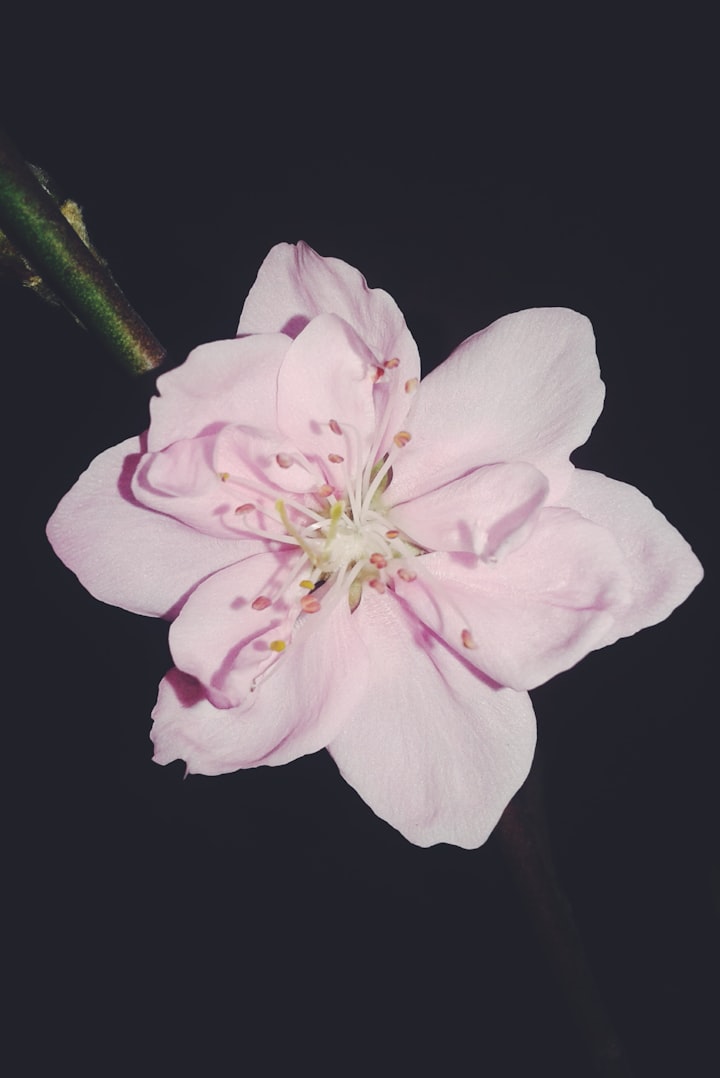Li Young Lee's Blossoms
Analyzing "From Blossoms" by Li Young Lee

"From Blossoms"
From blossoms comes
this brown paper bag of peaches
we bought from the boy
at the bend in the road where we turned toward
signs painted Peaches.
From laden boughs, from hands,
from sweet fellowship in the bins,
comes nectar at the roadside, succulent
peaches we devour, dusty skin and all,
comes the familiar dust of summer, dust we eat.
O, to take what we love inside,
to carry within us an orchard, to eat
not only the skin, but the shade,
not only the sugar, but the days, to hold
the fruit in our hands, adore it, then bite into
the round jubilance of peach.
There are days we live
as if death were nowhere
in the background; from joy
to joy to joy, from wing to wing,
from blossom to blossom to
impossible blossom, to sweet impossible blossom.

In “From Blossoms,” Li Young Lee portrays the joys that one may experience through an act as simple as eating a peach. The first stanza contains plain imagery of where the speaker bought a “brown paper bag of peaches” (2). The familiar image of a boy at a selling stand with a painted sign by the side of the road may evoke a sense of nostalgia in readers, who may have used to sell at stands themselves as children or bought from such stands before. Both the title and the first line indicate that the focus of this poem is where the peaches come from, like their origins from peach blossoms. The second stanza details the process peaches go through to reaching consumers, starting from the trees. After being picked, the peaches are transported in bins, where they are personified in “sweet fellowship,” which can both mean sweet as in the taste of the fruit and sweet as in a pleasant, harmonious relationship. This double meaning was one of the parts of this poem that I found to be most interesting. In one word, two statements are made about the state of the peaches in the bins. I found the end of the second stanza to be strange as eating dust is portrayed in a positive manner. Despite the seemingly unpleasant state of this act, the speaker depicts it as an integral part of the joy of eating peaches, as the dust is a familiar element of the summer season for the narrator. This portrayal of the “familiar dust of summer” is the line leading into the meta moment of this poem, where the speaker begins to appreciate eating peaches beyond the physical flavor (10). In the third stanza, the consumption of peaches is illustrated as something larger than simple eating, but the act of taking in the essence of the time and environment that the peaches were nurtured in. In addition to comparing eating peaches to carrying an orchard inside oneself, the speaker states that people eat “not only the skin, but the shade,” and “not only the sugar, but the days” (13-14). These descriptions make the origins of the peach more tangible to the reader and demonstrate how the environment they came from still reach to those who eat them. The fourth stanza rises to an even higher plane of existence, describing the pure joy that simply eating peaches can bring, which is strong enough to make days seem “as if death were nowhere in the background” (18-19). The surprising positivity that comes with simply eating peaches has the power to make people live as if there is no end to this happiness, forgetting about the always approaching concept of death. The repetition of “from joy to joy, from wing to wing, from blossom to blossom to impossible blossom, to sweet impossible blossom” at the end of the poem create an uplifting mood, spreading the speaker’s happiness to the reader (19-22). I liked this poem’s message that even simple, everyday acts can mean a lot when one appreciates the origin and past surroundings of objects. In this poem, every single peach, after being harvested and purchased, brought a part of the being of the orchard, and the being of the gradual process through which they were cultivated, from blossoms to “the round jubilance of peach” (16). When one truly appreciates simple objects beyond surface value, the benefits can be surprising. Rather than just viewing peaches as sweet summer fruit, the speaker acknowledges the powerful feelings of joy that they can evoke in people.
About the Creator
moon vixen
Musician, Artist, Writer
Instagram @vixensverse






Comments
There are no comments for this story
Be the first to respond and start the conversation.